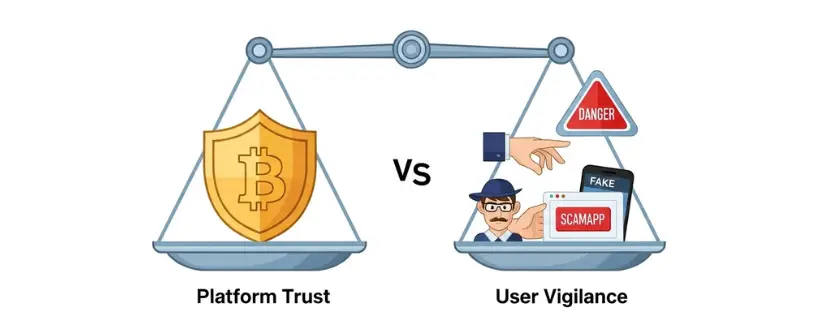


The growing popularity of Bitcoin in 2025 has attracted a surge in new investors, institutional interest, and unfortunately, cybercriminals. As more people search for opportunities to enter the market, the number of bitcoin scams and crypto scams continues to rise. Whether you are a beginner or a seasoned trader, understanding how to spot a bitcoin scammer and avoid investment scams is critical to protecting your assets.
[ez-toc]

Despite increased awareness, bitcoin scams have evolved alongside technology. In 2025, scammers use advanced phishing methods, fake crypto platforms, and even deepfake AI videos to trick unsuspecting investors. According to cybersecurity reports, crypto scams have become more targeted, leveraging personal data and social media insights to build trust before executing a fraud.
Bitcoin’s decentralized nature adds to the risk. Since there is no central authority to reverse transactions, once funds are sent to a scammer’s wallet, recovery is often impossible.

Understanding the methods used by scammers is the first step to avoiding them. Below are the most common forms of bitcoin scams that are still active in 2025:
These platforms promise high returns with little risk. They may mimic legitimate crypto exchanges or broker interfaces. Once a user deposits bitcoin, the funds are locked or stolen, and customer support becomes unreachable.
Scammers often pose as crypto influencers or well-known tech personalities offering bitcoin giveaways. Users are asked to send BTC to a wallet address to “verify” their identity or receive a higher return. The promised reward never arrives.
Phishing remains a key attack vector. These websites closely resemble real crypto exchanges and ask for your login credentials or wallet private keys. Once entered, your bitcoin is immediately stolen.
Some websites promise daily profits from cloud mining contracts. However, in most cases, there is no real mining operation. These are simply bitcoin scams designed to collect deposits and disappear.
In peer-to-peer crypto exchanges, scammers may fake payment confirmations or reverse payments after the BTC is released. Without proper security features, users risk losing their assets.
Social platforms are now breeding grounds for bitcoin scams. Fake project airdrops, wallet drainer links, and fraudulent customer support accounts are common. Always verify official links and never share private keys.

Learning how to spot a bitcoin scammer is essential in today’s market. Here are warning signs:

Avoiding crypto scams in 2025 requires vigilance. Here are best practices for keeping your bitcoin safe:
Bitunix is a secure platform with robust KYC, 2FA, and P2P dispute resolution. It offers a safer environment than unknown platforms where scams thrive.
Always double-check the domain you’re visiting. Bookmark the official site and avoid clicking on crypto-related links from unknown messages or emails.
Keep your wallet information offline and never share sensitive details with anyone—even if they claim to be from customer support.
Ensure the platform or project is registered or regulated by a recognized authority. Most investment scams operate outside legal frameworks.
Knowledge is your first line of defense. Stay updated through crypto forums, newsletters, and the Bitunix Academy, which publishes scam awareness resources regularly.

With the right precautions, yes—bitcoin is safe to buy in 2025. However, safety depends on your platform, your actions, and your ability to identify risks. Buying bitcoin on regulated exchanges like Bitunix and using secure wallets reduces the risk of falling victim to crypto scams.
Before buying bitcoin, ask yourself:
If the answer raises doubts, reconsider the transaction.
In early 2025, a new social token project called “MetaRise” promised 300 percent ROI in three months. Promoted via sponsored posts and fake celebrity endorsements, it collected $4 million in deposits in two weeks. Victims discovered too late that the team profiles were fake and the website was cloned from another project.
Red flags included:
This incident illustrates how even smart investors can fall for a well-crafted scam.
What are the safest ways to avoid bitcoin scams in 2025?
Use secure exchanges like Bitunix, enable 2FA, and never share sensitive wallet data.
Are bitcoin investment platforms safe?
Only if they are regulated and have verifiable records. Avoid platforms promising unrealistic returns.
How can I recover from a crypto scam?
Unfortunately, most bitcoin transactions are irreversible. Report incidents to local authorities and crypto cybersecurity services. Prevention is more effective than recovery.
How can I tell if a crypto exchange is fake?
Check licensing, online reviews, community presence, and platform audits. Scam exchanges often lack transparency.
Is it safe to use P2P crypto exchange platforms?
Yes, but only when using platforms like Bitunix that offer strong escrow services and fraud detection.
Disclaimer: Trading digital assets involves risk and may result in the loss of capital. Always do your own research. Terms, conditions, and regional restrictions may apply.
